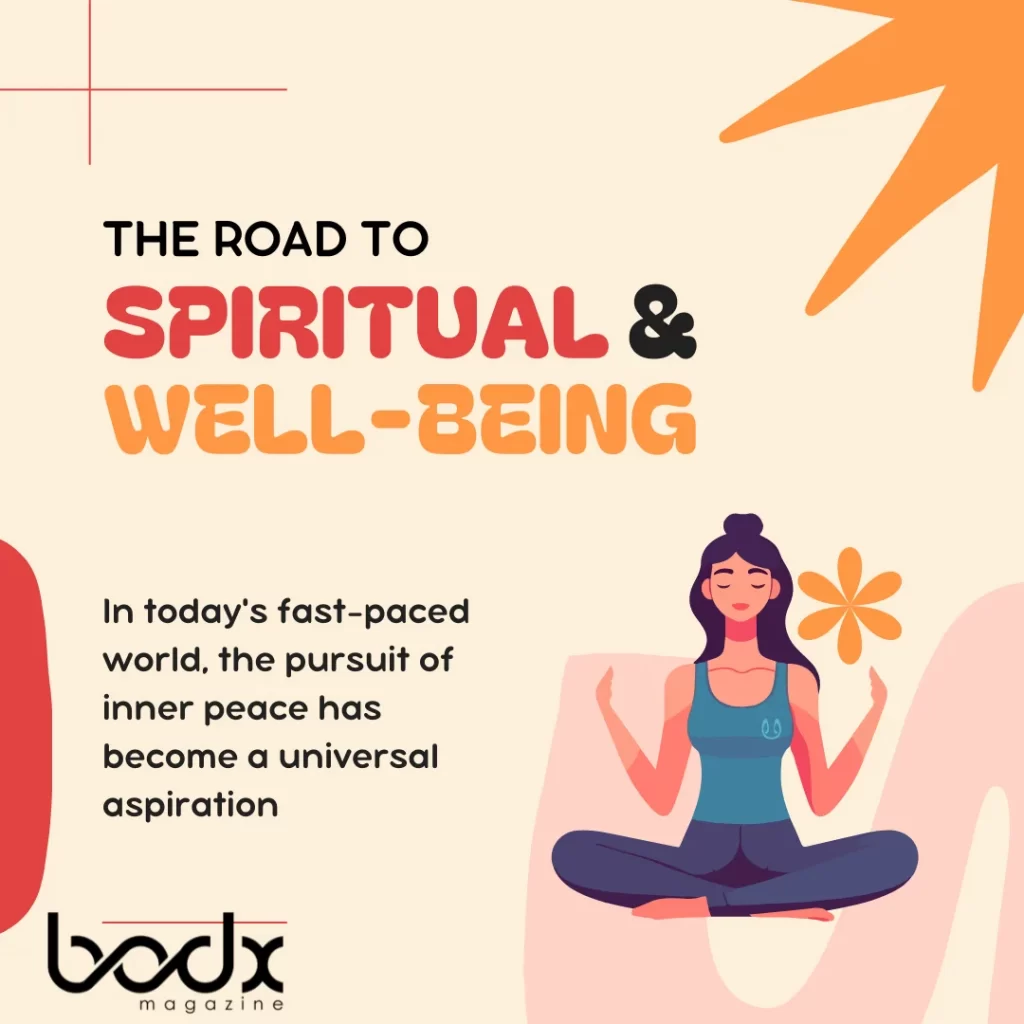Introduction
The Quest for Inner Peace
In today’s fast-paced world, the pursuit of inner peace has become a universal aspiration. The constant demands of modern life leave many of us yearning for tranquility and balance. This article aims to provide practical, straightforward steps to achieve spiritual well-being and inner peace.
Understanding Spiritual Well-being
Spiritual well-being is a harmonious state where one’s mind, body, and spirit are in sync. It’s about finding a sense of purpose and connection that transcends everyday experiences. This journey involves self-discovery, growth, and the nurturing of a deep inner calm.
Defining Spiritual Well-being
Spirituality vs. Religion
Many people confuse spirituality with religion, but they are distinct concepts. Spirituality is a personal experience of finding meaning and purpose in life. It can be pursued through various practices and beliefs. Religion, on the other hand, involves organized doctrines and practices shared by a community.
The Core Components of Spiritual Well-being
Spiritual well-being is built on several core components:
- Self-awareness: Understanding your true self and values.
- Connection: Feeling connected to something greater than oneself, whether it’s a higher power, nature, or humanity.
- Purpose: Having a sense of purpose and direction in life.
- Inner Peace: Achieving a state of tranquility and contentment.
Benefits of Achieving Spiritual Well-being
Mental Health Improvements
Spiritual well-being has a profound impact on mental health. It helps reduce stress, anxiety, and depression. Practices like meditation and mindfulness foster a calm and focused mind.
Enhanced Emotional Stability
A strong spiritual foundation enhances emotional stability. It provides tools to manage emotions and navigate life’s challenges with grace and resilience.
Physical Health Correlations
There is a growing body of evidence linking spiritual well-being to physical health. Practices like meditation can lower blood pressure, improve immune function, and enhance overall physical well-being.
Mindfulness and Meditation
Introduction to Mindfulness
Mindfulness is the practice of being fully present in the moment. It involves observing thoughts and feelings without judgment. This practice fosters a state of calm and clarity.
Different Forms of Meditation
Meditation is a powerful tool for achieving spiritual well-being. There are various forms of meditation, each offering unique benefits:
- Mindfulness Meditation: Focuses on being present in the moment.
- Transcendental Meditation: Involves repeating a mantra to reach a state of relaxation.
- Loving-Kindness Meditation: Promotes feelings of compassion and love towards oneself and others.
Daily Mindfulness Practices
Incorporating mindfulness into daily life can be simple and effective. Techniques include mindful breathing, body scan meditation, and mindful walking. These practices help anchor the mind and reduce stress.
Cultivating Gratitude
The Science of Gratitude
Research shows that gratitude has profound effects on well-being. It activates the brain’s reward system, releasing dopamine and serotonin, which enhance mood and emotional health.
Practical Gratitude Exercises
Practicing gratitude can be straightforward yet impactful. Keeping a gratitude journal, writing thank-you notes, and verbalizing appreciation are effective methods to cultivate gratitude.
Long-term Benefits of Gratitude
Over time, gratitude fosters a positive outlook, strengthens relationships, and increases overall life satisfaction. It shifts focus from what is lacking to what is abundant.
Connecting with Nature

The Healing Power of Nature
Nature profoundly impacts our well-being. It reduces stress, improves mood, and enhances cognitive function. Spending time in nature can rejuvenate the spirit and foster inner peace.
Activities to Foster Nature Connection
Engaging in activities such as hiking, gardening, bird-watching, or simply sitting in a park can deepen our connection with nature. These activities provide a sense of grounding and tranquility.
Integrating Nature into Daily Life
Incorporating nature into daily routines can be simple. Taking short walks, having plants at home, and practicing outdoor meditation are ways to integrate nature into everyday life.
Developing a Personal Spiritual Practice
Identifying Spiritual Beliefs
Identifying personal spiritual beliefs is the first step toward developing a spiritual practice. Reflect on what resonates with you and aligns with your values and experiences.
Creating Rituals and Routines
Creating personal rituals and routines can enhance spiritual well-being. This might include morning meditation, evening reflection, or weekly nature walks. Consistency is key.
The Role of Prayer and Reflection
Prayer and reflection are powerful tools for spiritual growth. They offer a way to connect with a higher power, seek guidance, and reflect on personal growth and challenges.
Embracing Solitude
The Importance of Alone Time
Solitude is crucial for self-discovery and reflection. It provides an opportunity to connect with oneself, away from external distractions and demands.
Solitude vs. Loneliness
While solitude is a chosen state that can be enriching, loneliness is often an unwelcome feeling of isolation. Embracing solitude involves finding joy and peace in being alone.
Practices to Embrace Solitude
Practices such as solo walks, journaling, and meditative activities can help embrace solitude. These activities foster introspection and personal growth.
Nurturing Relationships
The Role of Community in Spiritual Well-being
Community plays a vital role in spiritual well-being. Supportive relationships provide a sense of belonging, shared experiences, and mutual support.
Building Supportive Relationships
Building supportive relationships involves cultivating connections with like-minded individuals. Engage in community activities, join groups with shared interests, and foster meaningful interactions.
Practicing Compassion and Empathy
Practicing compassion and empathy strengthens relationships and enhances spiritual well-being. These qualities promote understanding, kindness, and deeper connections.
Managing Negative Thoughts
Cognitive Behavioral Strategies
Cognitive behavioral strategies help manage negative thoughts by challenging and reframing them. Techniques such as cognitive restructuring and thought diaries can be effective.
Mindfulness-Based Cognitive Therapy
Mindfulness-Based Cognitive Therapy (MBCT) combines cognitive therapy with mindfulness practices. It helps individuals recognize and break the cycle of negative thinking.
Positive Thinking Techniques
Techniques such as positive affirmations, visualization, and gratitude practices can promote positive thinking. These methods shift focus from negativity to positivity.
Stress Reduction Techniques
Identifying Stress Triggers
Identifying stress triggers is the first step in managing stress. Reflect on situations, thoughts, and behaviors that cause stress and develop strategies to address them.
Relaxation Methods
Relaxation methods such as deep breathing, progressive muscle relaxation, and guided imagery can effectively reduce stress and promote relaxation.
The Role of Physical Activity
Physical activity is a powerful stress reliever. Regular exercise releases endorphins, improves mood, and reduces stress levels, contributing to overall well-being.
Forgiveness and Letting Go
The Power of Forgiveness
Forgiveness is a transformative practice that frees individuals from resentment and anger. It promotes healing and inner peace, allowing for personal growth and emotional freedom.
Steps to Forgive and Move On
Steps to forgive include acknowledging the hurt, empathizing with the offender, letting go of grudges, and committing to forgive. This process fosters healing and reconciliation.
Emotional and Psychological Benefits
Forgiveness offers numerous emotional and psychological benefits, including reduced stress, improved mental health, and enhanced emotional well-being.
Setting Healthy Boundaries
Understanding Personal Boundaries
Understanding personal boundaries is crucial for maintaining well-being. Boundaries define acceptable behaviors and protect emotional and mental health.
Communicating Boundaries Effectively
Effective communication of boundaries involves assertiveness and clarity. Clearly express your needs and limits to others, ensuring mutual respect and understanding.
Maintaining Boundaries Consistently
Consistent maintenance of boundaries reinforces their importance. Respect your boundaries and expect others to do the same, ensuring healthy and respectful relationships.
Incorporating Creativity
The Spiritual Benefits of Creativity
Creativity nurtures the spirit by providing an outlet for self-expression and exploration. It fosters a sense of accomplishment, joy, and connection with the inner self.
Creative Practices for Inner Peace
Engage in creative practices such as painting, writing, music, or crafting. These activities promote relaxation, mindfulness, and a sense of fulfillment.
Making Time for Creative Expression
Prioritize creative expression by setting aside dedicated time for creative activities. Incorporate them into your routine to enjoy their spiritual benefits regularly.
The Role of Diet and Nutrition
Foods that Support Mental Health
Certain foods can support mental health and well-being. Incorporate foods rich in omega-3 fatty acids, antioxidants, and vitamins to promote brain health and emotional stability.
The Gut-Brain Connection
The gut-brain connection highlights the impact of gut health on mental well-being. A balanced diet with probiotics and fiber supports a healthy gut and a positive mood.
Mindful Eating Practices
Mindful eating involves paying attention to the experience of eating, savoring flavors, and recognizing hunger and fullness cues. This practice promotes a healthy relationship with food.
Physical Exercise and Spiritual Well-being
Exercise as a Stress Reliever
Exercise is a natural stress reliever. It reduces cortisol levels, releases endorphins, and improves overall mood, contributing to spiritual well-being.
Yoga and Spiritual Connection
Yoga combines physical postures, breath control, and meditation, fostering a deep spiritual connection. It enhances flexibility, strength, and inner peace.
Developing a Balanced Exercise Routine
A balanced exercise routine includes a mix of cardiovascular, strength, and flexibility exercises. This approach supports physical health and overall well-being.
Sleep and Rest
The Importance of Quality Sleep
Quality sleep is essential for
mental and physical health. It restores the body, consolidates memories, and supports cognitive function and emotional stability.
Creating a Restful Environment
Creating a restful environment involves reducing noise, maintaining a comfortable temperature, and minimizing light. This promotes better sleep quality.
Practices for Better Sleep
Practices such as establishing a bedtime routine, avoiding screens before bed, and practicing relaxation techniques can improve sleep quality and duration.
Journaling and Self-reflection
The Benefits of Journaling
Journaling provides a safe space for self-expression and reflection. It helps process emotions, set goals, and gain insights into personal growth.
Prompts for Spiritual Reflection
Spiritual reflection prompts can guide journaling practices. Questions like “What am I grateful for today?” or “What challenges did I overcome?” foster introspection.
Creating a Journaling Routine
Establish a regular journaling routine by setting aside time each day or week. Consistency helps integrate journaling into daily life and maximize its benefits.
Seeking Professional Guidance
The Role of Spiritual Advisors
Spiritual advisors provide guidance and support on the spiritual journey. They offer wisdom, perspective, and encouragement to deepen spiritual practice.
Finding the Right Therapist
Finding a therapist who aligns with your values and needs is crucial. Look for professionals with experience in spiritual and holistic approaches to therapy.
Combining Professional Help with Personal Practice
Combining professional help with personal spiritual practices enhances overall well-being. It provides a comprehensive approach to addressing mental, emotional, and spiritual needs.
Conclusion
The journey to spiritual well-being and inner peace is a deeply personal and transformative process. By incorporating practices such as mindfulness, gratitude, connection with nature, and creative expression, we can nurture our spirits and achieve a state of inner tranquility. Setting healthy boundaries, maintaining a balanced diet, engaging in physical exercise, and seeking professional guidance further support this journey. Ultimately, spiritual well-being is about finding harmony within ourselves and with the world around us, fostering a life of purpose, joy, and inner peace.
FAQs
1. What is the difference between spirituality and religion?
Spirituality is a personal experience of finding meaning and purpose, while religion involves organized doctrines and practices shared by a community.
2. How does mindfulness improve mental health?
Mindfulness reduces stress and anxiety by promoting a state of calm and focus, which enhances overall mental health.
3. What are some practical ways to practice gratitude daily?
Keeping a gratitude journal, writing thank-you notes, and verbalizing appreciation are effective ways to practice gratitude.
4. How can nature improve our well-being?
Nature reduces stress, improves mood, and enhances cognitive function, promoting overall well-being.
5. What are some effective stress reduction techniques?
Deep breathing, progressive muscle relaxation, and physical exercise are effective stress reduction techniques.
6. How does creativity benefit spiritual well-being?
Creativity provides an outlet for self-expression and exploration, fostering a sense of accomplishment and inner peace.
7. Why is quality sleep important for well-being?
Quality sleep restores the body, consolidates memories, and supports cognitive function and emotional stability.
8. How can journaling support personal growth?
Journaling helps process emotions, set goals, and gain insights into personal growth, fostering self-awareness.
9. What role do spiritual advisors play in well-being?
Spiritual advisors provide guidance and support, offering wisdom and perspective to deepen spiritual practice.
10. How can professional guidance complement personal spiritual practices?
Professional guidance addresses mental, emotional, and spiritual needs, enhancing overall well-being when combined with personal practices.



















